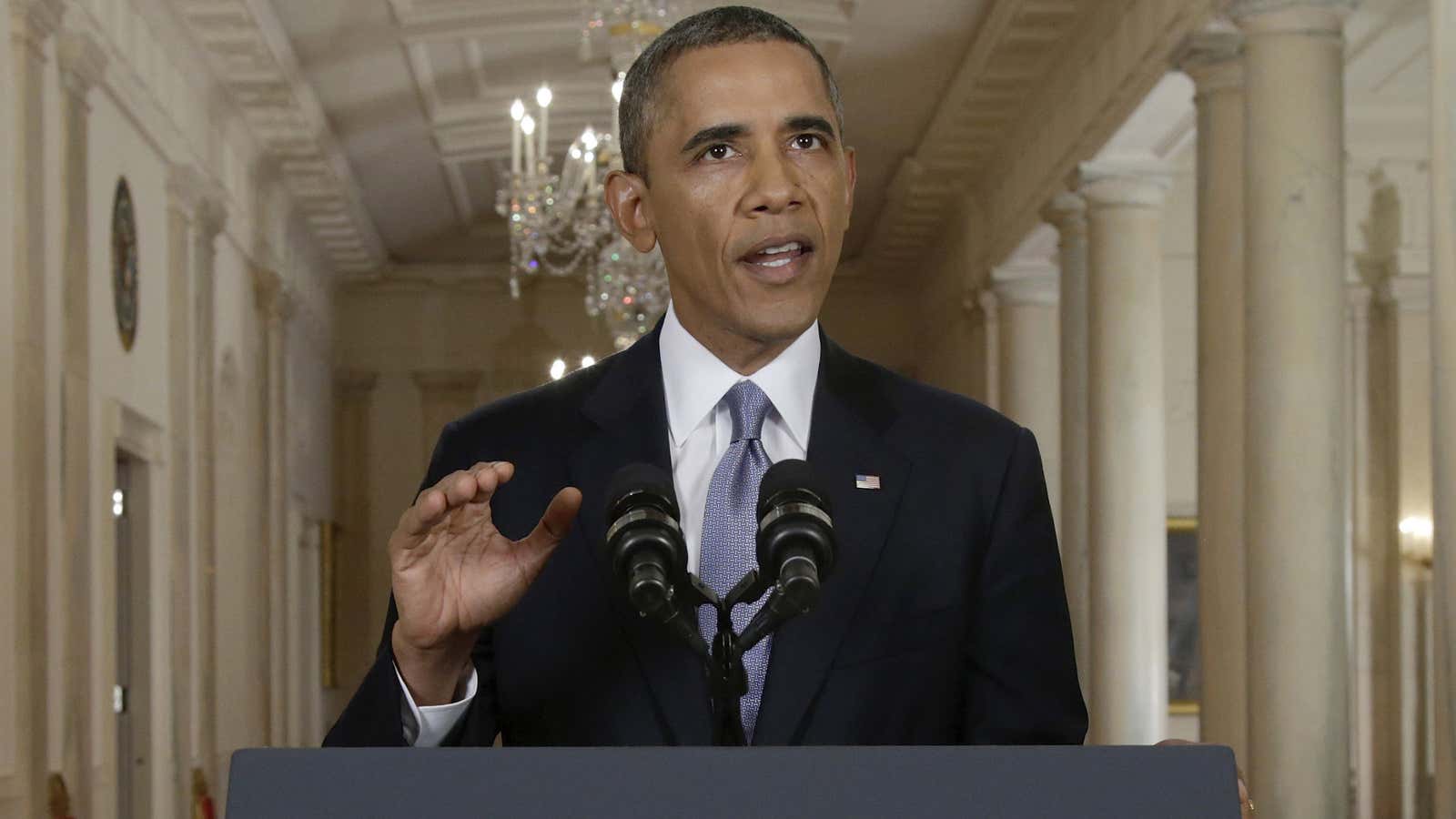In a sober, narrowly framed speech Tuesday night, President Barack Obama argued that deterring chemical weapons use—not regime change—remained the goal of any American military strike in Syria. Ob ama said he would delay a vote in Congress on the issue, seek a UN resolution requiring Assad to give up his chemical weapons and explore Russia’s surprising offer to help secure Syria’s chemical weapons.
The speech’s most interesting passage was its final one. On the eve of the 9/11 anniversary, Obama offered a rough outline of a new, more limited vision of America’s role in the world.
“America is not the world’s policeman. Terrible things happen across the globe, and it is beyond our means to right every wrong,” Obama said. “But when, with modest effort and risk, we can stop children from being gassed to death, and thereby make our own children safer over the long run, I believe we should act. That’s what makes America different. That’s what makes us exceptional. With humility, but with resolve, let us never lose sight of that essential truth.”
Opinion polls show that Americans flatly disagree. If the Russian-Syrian offer to turn over chemical weapons proves insincere, it may shift public opinion but not to a wide extent. Obama has delayed his Syria problem, not eliminated it.
Turning Syria’s chemical weapons over to international control will be extraordinarily difficult and not end the conflict in Syria. But it is a major step forward that should be pursued. For Syrians, it will decrease the likelihood that chemical weapons will be once more used against civilians. For Americans, it will reduce the chance of chemical weapons falling into the hands of jihadists.
Syrian President Bashar al-Assad is unlikely to turn over his entire chemical weapons arsenal, but destroying most of the stockpile is a deterrent against future use by Assad and other authoritarian rulers.
What Obama’s speech lacked was a long-term strategy for Syria and the region. From Assad’s chemical weapons attack, to Egypt’s coup, to Israel’s rising tensions with Iran, events have shown, over and over, that the administration’s “pivot to Asia” is a fantasy. The world economy’s reliance on Middle Eastern oil, the United States’ alliance with Israel and the threat of terrorism from the region requires the United States to engage, not walk away.
Washington needs to carefully assess which events in the Middle East matter strategically to the United States; whether Washington can influence them, and then develop realistic, long-term plans to do so without automatically resorting to military force. As I’ve argued before, there are moderates in the region we should listen to and strive to support.
Twelve years after the September 11th attacks, three forces are engaged in a historic struggle for the control of the Middle East: moderates who embrace modernity; autocrats with unrealistic hopes of returning to the past, and jihadists who threaten us all.
Yes, power struggles in Syria, Egypt and Libya have devolved to the point where there is little Washington can do. But Tunisia, Jordan, Turkey, the Palestinian territories and some Gulf states represent places where private sector investment, trade, diplomacy, education, access to technology and security force training can play a stabilizing role. Engaging now can help prevent us from ending up in the no-win situation we faced in Syria.
The fact that Assad and his Russian backers blinked this week also offers a lesson to Americans who oppose the use of military force. The credible threat of military force produced a potential diplomatic breakthrough in Syria. The threat of lethal recourse is part of diplomacy — not anathema to it. Assad would never have made this concession if the administration had simply turned a blind eye to his horrific chemical attack.
In the weeks ahead in Syria, the United States should negotiate with Russia and Iran and try to reach a political settlement to the conflict. The chances of success are low but coordinated pressure from both sides’ foreign supporters could cause Alawites and Sunnis to agree to a UN-backed power sharing agreement.
At the same time, the administration should continue quietly arming Syria’s rebels. As was shown in Bosnia, changing the military balance on the ground can aid diplomacy. Sweeping advances on the ground by Croatian forces covertly armed by the United States brought the Serbs to the bargaining table. Supporting moderate Sunnis will also create a counter-weight to the Sunni jihadists whom Washington, Moscow, Tehran and Alawites all fear.
Most of all, Obama should not think his Middle East challenges are over. The region will challenge him again and again throughout the remainder of his term. Twelve years after 9/11, the lesson remains that we cannot ignore the region. The challenge is to find effective ways to engage diplomatically, not militarily.
This originally appeared on Reuters. More on our partner site:
Somber ceremonies mark 12th anniversary of September 11 attacks
Russia could boost Iran arms sales if US strikes Syria
Syria’s chemical weapons; decades to build, years to destroy
